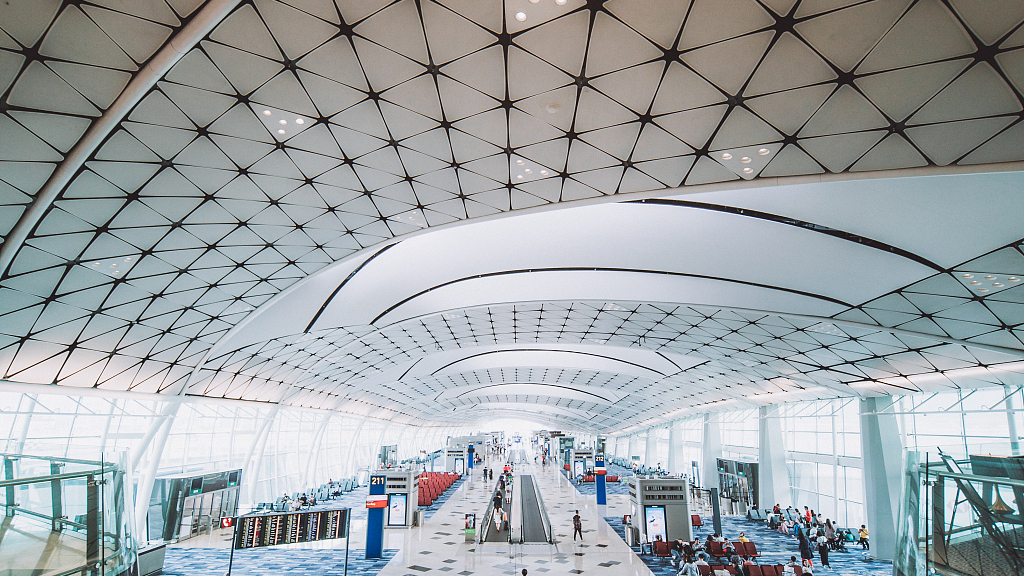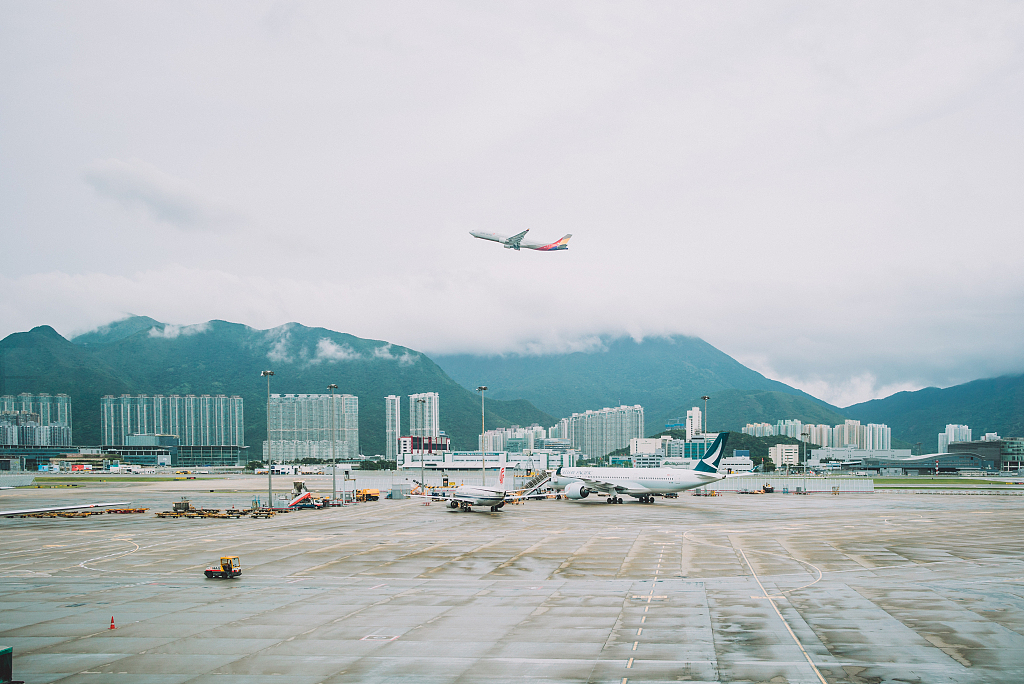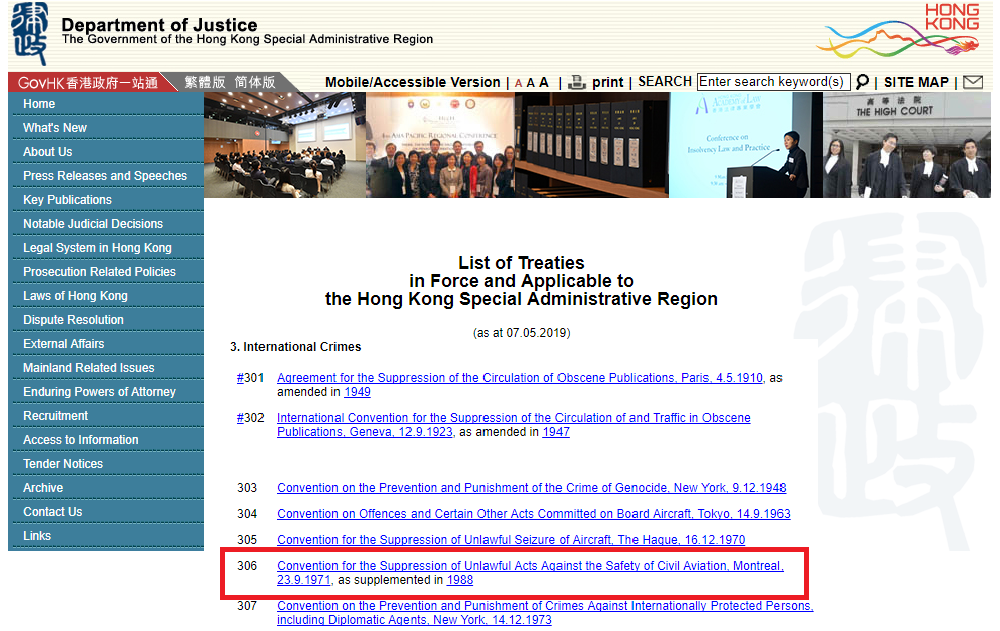

Editor's note: Shen Zhourong is a former Aeronautical Information Service Officer with Air Traffic Management Bureau of Civil Aviation Administration of China; he is now a lecturer at Beijing International Studies University. This article has also received contribution from Zheng Liwei, a lecturer of Aviation Laws and Regulations at Civil Aviation Flight University of China. The article reflects the authors' opinions, and not necessarily the views of CGTN.
The months-long protests in Hong Kong have now shifted their focus to the Hong Kong International Airport, one of the busiest aviation hubs in the world. A once five-star Skytrax rated airport has now descended into chaos out of what was allegedly intended to be a quiet sit-in, only to be disproved by the harassment, abuses, and violent attacks on passengers, media personnel and police officers.
Little to the protesters' knowledge, what appears to be a quest for democracy is violating the very principles that uphold a democratized society with an expected degree of civility and rule of law. Their airport-based demonstrations, which were never approved by the authority, are in grave violation of the Protocol for the Suppression of Unlawful Acts of Violence at Airports Serving International Civil Aviation.
Enacted on February 24, 1988, at Montreal, the Protocol for the Suppression of Unlawful Acts of Violence at Airports Serving International Civil Aviation is a supplementary to the Convention for the Suppression of Unlawful Acts Against the Safety of Civil Aviation (The Montreal Convention) designed to enter into force at August 6, 1989.
The Protocol supplement and the Convention, which shall be read and interpreted together as one single instrument, was an effort made by the international civil aviation community to mend the fences left by what the Hague Convention (Convention for the Suppression of Unlawful Seizure of Aircraft) failed to do, that is, to declare violent attacks in international civil aviation airports a crime.
According to Article II of the protocol:
"Any person commits an offense if he unlawfully and intentionally, using any device, substance or weapon: (a) performs an act of violence against a person at an airport serving international civil aviation which causes or is likely to cause serious injury or death; or (b) destroys or seriously damages the facilities of an airport serving international civil aviation or aircraft not in service located thereon or disrupts the services of the airport, if such an act endangers or is likely to endanger safety at that airport."

Hong Kong International Airport, May 29, 2019. /VCG Photo
The Protocol put things into perspective on the heinous and egregious violent behavior of the protesters at the Hong Kong International Airport.
Though some people may question the very applicability of this protocol to Hong Kong, which in 1988 was still under the British colonial rule, and now runs on a different legal system as that of the Chinese mainland.
According to the official List of Parties to this convention and protocol found in International Civil Aviation Organization (ICAO), several footnotes can be cited to explain the situation with Hong Kong regarding its applicability. What is worth noting is the notification issued by the Government of the People's Republic of China dated June 12, 1997:
"It is provided both in Section XI of Annex 1 to the Joint Declaration, 'Elaboration by the Government of the People's Republic of China of its Basic Policies Regarding Hong Kong, and Article 153 of the Basic Law of the Hong Kong Special Administrative Region of the People's Republic of China...that international agreements to which the People's Republic of China is not a party but which are implemented in Hong Kong may continue to be implemented in the Hong Kong Special Administrative Region." "The Protocol...which applies to Hong Kong at present will continue to apply to the Hong Kong Special Administrative Region with effect from July 1, 1997. Within the above ambit, responsibility for the international rights and obligations of a party to the Protocol will be assumed by the Government of the People's Republic of China."
These statements state the applicability of the protocol to Hong Kong, covering the period both before and after its return to China, and to its present day.
Hong Kong, under the rule of "One Country, Two Systems," is privileged to a different legal system from that of the Chinese mainland. However, according to the List of Treaties in Force and Applicable to the Hong Kong Special Administrative Region, from the official website of the Department of Justice of the Government of Hong Kong Special Administrative Region, the entry 306 of section 3 International Crimes, clearly stipulates the standing effect of Convention for the Suppression of Unlawful Acts Against the Safety of Civil Aviation, Montreal, September 23, 1971, as supplemented in 1988.

A screengrab (splint joint) of the official website of the Department of Justice of the Government of HKSAR, May 7, 2019.
Not only did the protesters inflicted serious injury and physical harm to media personnel and passengers within the parameters of the airport, but also disrupted its operations, leading to cancellation of flights, leaving hundreds of innocent passengers stranded.
These horrible acts are a word-to-word demonstration of the stipulation of the Protocol for the Suppression of Unlawful Acts of Violence at Airports Serving International Civil Aviation that applies to Hong Kong since it came into force.
These protesters are claiming to protect and defend a democratized Hong Kong with an independent legal system under the rule of law. Ironically, they should be the first ones to be brought to justice according to the very idea they are pretending to uphold.
(If you want to contribute and have specific expertise, please contact us at opinions@cgtn.com.)

Copyright © 2018 CGTN. Beijing ICP prepared NO.16065310-3
Copyright © 2018 CGTN. Beijing ICP prepared NO.16065310-3